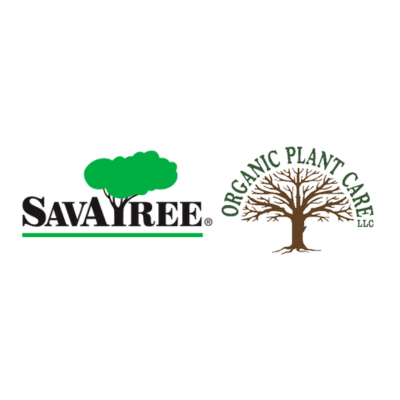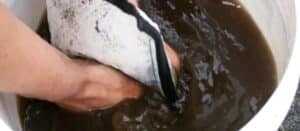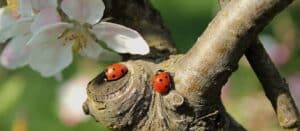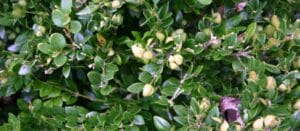When it comes to organic lawn care in New Jersey, it can be difficult to separate truth from fiction, good from bad, and true organic practices from pseudo-organic. We’re often asked to explain the pros and cons of organic lawn care practices and why we recommend switching to an organic lawn program. Common questions include:
- What does “organic” mean when it comes to lawn care?
- Is organic lawn care better than conventional/synthetic lawn fertilization, weed control, and pest management?
- What does it really take to “do organic” properly?
- Why do organic lawn services cost more?
In this article, we answer those questions and more about organic lawn care services.
What is Organic Lawn Care?
There are two parts to creating an organic lawn:
- the materials used as fertilizers and as treatments for unwanted weeds, pests, and diseases, and
- the techniques used to maintain the lawn.
Simply put, organic lawn care does NOT involve the use of any synthetic (man-made) substances or chemicals. That means organic lawns do not use most of the “weed and feed” products, pesticides, herbicides, and fungicides you typically see in garden centers or offered by the major lawn companies.
Instead, organic lawn care companies use carbon-based substances derived from plant and animal parts or residue. This includes things like:
- compost and leaf mulch,
- compost tea/soil conditioner
- manure,
- seaweed,
- mycorrhizae,
- worm castings, and
- bone char.
Organic practitioners also use naturally occurring minerals, such as greensand and potash to provide the micronutrients turf grass needs.
What’s the goal of organic lawn care?
One goal of sustainable/organic lawn care is, obviously, to reduce the number and volume of harmful chemicals introduced into the environment.
But beyond chemical use on lawns, traditional lawn care also:
- introduces 26.7 million tons of air pollutants from mowing (in 1 hour, a lawn mower produces as much air pollution as driving a car for 100 miles)
- accounts for 30% of residential water usage
- consumes over 800 million gallons of gasoline annually to power lawn mowers
Organic practices can also reduce the amount of time and effort required to maintain your lawn.
Traditional lawn care takes up more time than most people realize. For example,
- the average American lawn is 1/3 acre
- 54 million Americans mow their lawns each weekend
- homeowners spend an average of 40 hours a season, or one full work week, mowing their lawns (imagine if you took a vacation instead!)
For details on the techniques you can use to make lawn care easier and more effective, see our article on organic lawn care tips >>
Is Organic Lawn Care better than conventional lawn service?
The answer depends on what you mean by “better”.
For example, synthetic fertilizers feed plants directly and so are taken up quickly, resulting in a rapid improvement in the color of your lawn. On the other hand, much of this fertilizer doesn’t reach the plants – instead, it runs off into lakes, streams, the ocean, and groundwater. The EPA estimates that roughly 70 million pounds of pesticides drift from their intended target every year.
Organic lawn fertilizer feeds the soil instead, improving soil health by encouraging the growth of beneficial organisms. This, in turn, improves the health of lawn grasses, leading to stronger, more disease- and pest-resistant turf.
Synthetic pesticides, herbicides, and fungicides can be very effective, quickly killing weeds and insects, and treating diseases. In contrast, organic treatments may take longer to make a visible impact and may need more applications. But inorganic chemical treatments have been linked to diseases in humans, pets, and wildlife, as well as the death of important pollinators.
Synthetic Chemicals Harm Pets and Children
Pesticides, herbicides, and insecticides are all created to kill – so it makes sense that they would have ill effects on other living things.
Some states, such as Connecticut, have banned certain commercial, synthetic pesticides from public properties such as parks, schools, and playgrounds. Because children (and their immune systems) are growing and developing, they are more susceptible to the harmful effects of these pesticides.
Children are generally exposed to lawns more than adults, just through general life and play. Removing synthetic pesticides is one way to encourage children to spend time outdoors without worrying about negative side effects from chemicals.
Synthetic pesticides and other inorganic chemicals on lawns also harm pets. Significant increases in cancer have been found in dogs that were exposed to chemically treated lawns. One study showed a 70% increase in canine malignant lymphoma when exposed to conventional lawn pesticides. Dogs – who love to play, run, and roll in the grass – often take the chemicals indoors with them, further increasing the impact. Unlike shoes, which can be removed, and clothes, which can be washed, dogs’ paws and fur often retain the chemicals for extended periods of time.
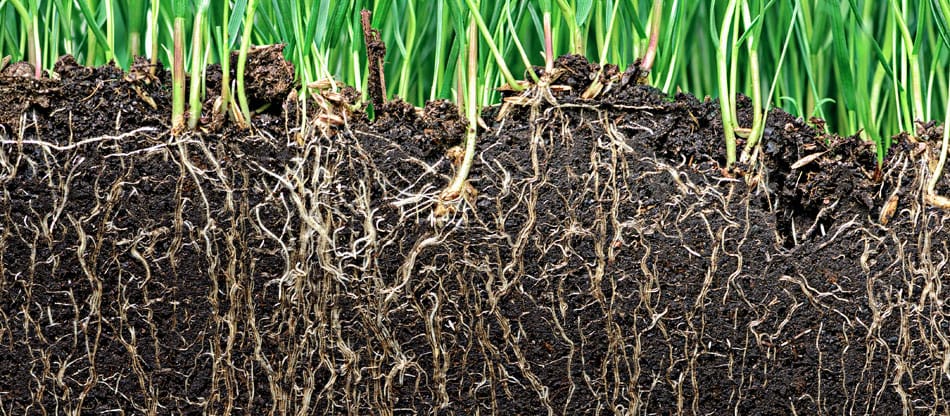
Organic lawn care helps turf grass develop healthy roots for a lush, green lawn
What does an Organic Lawn Care Program involve?
As you can probably guess from our name, Organic Plant Care LLC provides truly organic lawn care services. This means that we only use organic substances for organic lawn care. And, most importantly, we conduct a thorough soil analysis before we apply any kind of treatment to your lawn.
Perform a Soil Test First
Each landscape is different, and each lawn is different. Treating them with a one-size-fits-all fertilizer does not take into account the individual needs of each lawn. A soil test will check the pH levels and the levels of various nutrients in your soil, especially levels of N (nitrogen), P (phosphorus), and K (potassium). The soil test might also check for lime, sulfur, and other elements.
This is why the first step we take in organic lawn care is to come to your property and administer a soil test. We need to know which nutrients are lacking and which are in abundance. Both too little and too much of one nutrient can have ill effects. It’s kind of like vitamins – if you are lacking Vitamin D in your diet, taking more Vitamin C is not going to heal the core issues. Similarly, if your lawn is low on magnesium and you treat it with a general fertilizer that contains a lot of nitrogen, your lawn is going to have issues and is not going to thrive.
How long will it take if I switch to an Organic Lawn Care Program?
It’s important to know that it will take time to see the full effects when you switch to an organic approach for your lawn
If you’ve ever spent time researching how food can be certified as organic, you’ll know that the process takes years (usually at least three). This is because it takes a while for pesticides to break down and/or dissipate from an area.
The same is true for your lawn. If you decide to switch to an organic lawn, the changes won’t happen overnight. First, any previously-applied synthetic chemicals will take a while to seep from the ground or decompose. So while you may be using only organic materials, your property won’t be fully free of synthetic substances for at least a year.
You’ll also notice some changes in the composition of your lawn (for example, some weeds will likely appear) as the nutrients in your soil level out. While we can knock back weeds with organic weed prevention, we can’t eliminate them entirely like a synthetic herbicide can – be prepared to tolerate some weeds in your lawn.
See Clover in the Lawn – Good or Bad?
Over the course of about three years, organic treatments and proper care of your grass will lead to a lush, green lawn that’s healthy and free of toxic materials. Just give nature some time to bounce back from all of the chemicals that were previously applied and allow all nutrients to get into the soil where they can support the growth of a vigorous lawn.
How can I tell if my Lawn Care Service is really organic?
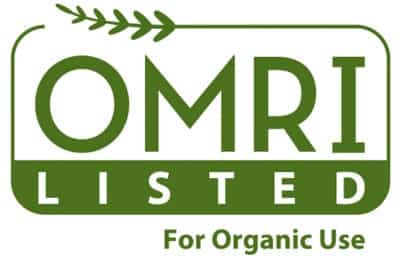
Look for the OMRI Listed(R) logo to ensure the product is truly organic
There are many products and lawn care companies that claim to be “organic” – but that doesn’t really tell you the full story.
If you’re buying lawn care products at your local garden center, look for ones that say “OMRI Listed®”. This means that the Organic Materials Review Institute has examined the product and approved it for organic growing.
When working with a lawn care company, ask about the products they use, the frequency of treatments, and the quantity of material used.
“Organic” Doesn’t Always Mean Organic (& How That Affects Cost)
Many businesses use a “bridge product” that’s part synthetic/part organic, rather than using only organic materials.
Why?
Because organic fertilizers have a far lower concentration of nitrogen (N) than is found in conventional, inorganic fertilizers. To get the same effect, you have to apply about four times more organic fertilizer, leading to higher material and labor costs that are passed on to the customer. To keep costs low, companies choose to “augment” their lawn fertilizer with synthetic substances.
Also, ask the lawn care company about the equipment used to apply organic treatments to your lawn. Is that equipment also used to apply inorganic treatments? If so, the end result is that your lawn is no longer organic – it’s impossible to completely prevent contamination, no matter how thoroughly the equipment is cleaned between uses.
Quantity / Frequency Matters
Some companies put down less fertilizer, or fertilize less frequently, in an attempt to be the low-cost provider. Unfortunately, that means your lawn doesn’t get enough fertilizer (or other treatments, such as pre-emergent weed suppression) and ends up looking far worse than it should. If you’ve heard friends or neighbors complaining that “organic lawn care doesn’t work” it’s probably because their lawn service provider didn’t apply enough organic materials.
It’s Not Just About The Chemicals
Finally, does the company perform a comprehensive soil analysis before beginning any fertilization program? Organic practices (and NJ state law) specify that treatments should be based on an evaluation and clear understanding of the current situation. That allows the provider to tailor applications to address any underlying issues with your lawn, rather than just applying a “standard” treatment that may not be appropriate.
Ready to Switch to Organic Lawn Care?
Homeowners across New Jersey and eastern Pennsylvania have a choice when it comes to caring for their lawn.
The first step is to learn about the options available to you and consider how those fit with your lifestyle and views. To start, check out the Lawn Care section of our website. You’ll find details on common lawn issues, fertilization options, turf types, mowing techniques, and overall lawn care, with a focus on organic options that are better for your health and the environment.
We see many cases of improper, excessive, and unnecessary use of yard chemicals, such as pesticides and fertilizer. If you’d like to take a different approach to lawn care this year, give us a call at 908-309-6611. We’d love to help you get started with organic care for your yard!
GET THE LATEST NEWS
Subscribe to the Organic Plant Care Newsletter and get timely and helpful tips and updates monthly.
There's no spam - we promise!
